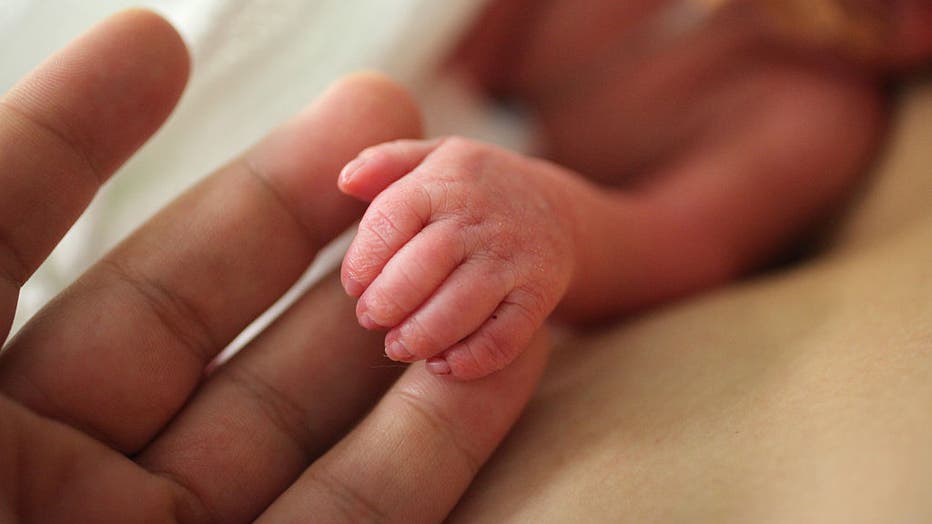US birthrates: People over 40 giving birth surpass teens for first time
Study: 1 in 5 parents worry their child has no friends
Dr. Sarah Clark, a research scientist at the University of Michigan Health C.S. Mott Children's Hospital joins LiveNOW's Carel Lajara to discuss the study of parents and their concerns regarding their children having friends.
LOS ANGELES - More parents are having kids in their 40s. Here’s why.
It used to be considered unusual—maybe even taboo—for someone to start a family after 40. But new federal data confirms what many families already know: Today, waiting to have children is increasingly common, and for many, it’s the right choice.
According to an April 2025 report from the National Center for Health Statistics (NCHS), part of the CDC, the birthrate among people aged 40 and older has now surpassed that of teens for the first time on record. The trend reflects a broader cultural and medical shift in how Americans approach parenting, careers, and family planning.
What the CDC data shows
By the numbers:
The overall U.S. birthrate has been on the decline for decades. The number of babies born in the U.S. dropped by 14% between 1990 and 2023, and the average number of children per family dropped to 1.62 in 2023—down from 1.66 the previous two years, according to the CDC report.
But within that broader decline, one group stands out: older parents.
- Birthrates among people aged 35 to 39 increased 71% from 1990 to 2023.
- Birthrates among those aged 40 to 44—and even older—rose by 127%.
- For the first time ever, parents over 40 are giving birth more often than teens.
Experts cited in the original coverage from Parents.com say this shift is no coincidence. It’s the result of medical advances, social acceptance, and a changing sense of what it means to be ready to raise a child.

FILE - A newborn baby grasps an adult’s finger. (Photo by Jennifer Polixenni Brankin/Getty Images)
Why people are waiting longer to start families
The backstory:
There are many reasons why people today are choosing to have children later in life. Here are a few of the most common, according to health experts and real parents who spoke to Parents.com:
- Fertility technology has changed everything: "Advances in medical care, especially around egg freezing and IVF, have allowed people to literally ‘freeze’ time," said Dr. Dallas Reed, an OB-GYN and medical geneticist at Tufts University School of Medicine.
- Finances matter: Building a career and achieving some level of financial stability before having kids is increasingly important, especially given the rising cost of housing and childcare.
- Emotional readiness plays a role: Many parents say waiting gave them the clarity and maturity they needed. "I feel more confident in my ability to parent intuitively," said author Katherine Rose Woller. "And I also know the value in prioritizing my own well-being—without guilt."
What are the risks—and benefits—of later-in-life parenting?
What they're saying:
Pregnancy after 35, sometimes called "advanced maternal age," does carry some increased medical risks. The American College of Obstetricians and Gynecologists (ACOG) notes higher rates of:
- Gestational diabetes
- Preeclampsia
- Miscarriage or stillbirth
- Chromosomal abnormalities
- C-sections and blood clots
But there are benefits, too. According to Dr. Tami Rowen, an OB-GYN and menopause specialist at Roon, later pregnancies are often planned and well-supported.
"The risks of pregnancy complications and genetic risks are higher and cannot be mitigated, but for some people having children at older ages may mean they are past the age of experimentation with substances or poor health habits and may have healthier bodies and lifestyles to help maintain a healthy pregnancy and family," she told Parents.com. They also tend to lead healthier lifestyles and avoid tobacco and alcohol.
Some studies have even suggested cognitive benefits and improved longevity for parents who have children later in life, though more research is needed.
Big picture view:
This isn’t just a medical story—it’s a cultural one. Fewer people are having kids, and those who do are waiting longer. That may pose long-term questions for the U.S. labor force and social safety nets, but for now, it also reflects a society where people are being more intentional about when—and with whom—they start families.
Whether it’s due to career goals, medical advancements, or simply waiting for the right partner, more people are choosing to become parents later in life. And according to the CDC’s latest report, that’s no longer the exception. It’s the trend.
The Source: This article is based on U.S. birth data from the National Center for Health Statistics (CDC), along with reporting and quotes originally published by Parents.com.

